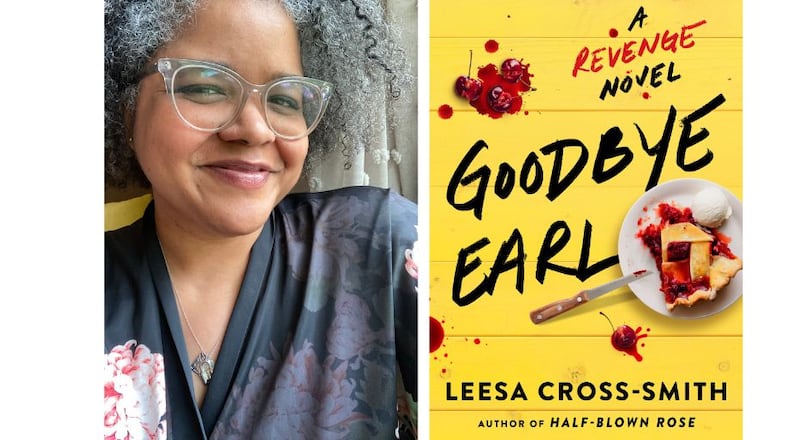It isn’t necessary to cue up The Chicks’ 1999 bluegrass anthem “Goodbye Earl” before reading Kentucky author Leesa Cross-Smith’s new work of fiction by the same name. But rocking out with The Chicks is a rousing way to set the mood for this rollicking summer beach read — a “revenge novel” that digs into the vigilante-justice response to domestic violence while shining a light on the powerful bonds of female friendship.
“Goodbye Earl” opens in 2019 when four best friends reunite after a tragedy following their 2004 high school graduation prompted one of their foursome to flee. Kasey Fritz vowed never to return to the fictional Southern town of Goldie, but after 15 years she’s summoned back for a wedding and is dismayed to discover Goldie has transformed into the kind of town that’s replaced its KFC with a hotel selling $30 platters of fried chicken.
Told in dual timelines that rotate back and forth between the present-day wedding and their fateful high school graduation, Cross-Smith spreads the narrative evenly between her four point-of-view characters. Kasey and her three best friends — Rosemarie Kingston, Ada Plum-Castelow, and Caroline “Caro” Foxberry — may not have lived in the same town for 15 years, but their emotional tether is as strong as ever.
The novel kicks off with a frothy good time. Referring to their girl group as “RACK,” an acronym formed from their first names, the foursome’s conversations effervesce with adolescent phrases of affection punctuated with the b-word and run-on interjections of “forreal!” as they gorge on pink-confetti cupcakes and toss back prosecco. The members of RACK are accomplished, vibrant and diverse, and when brought together are a fun group to hang out with.
The book’s lighthearted tone quickly turns serious, though, when a community with a history of failing to protect its women from its men is forced to face that legacy. The first “Earl” in the novel is revealed early on when teenage Kasey’s abusive stepfather arrives home one day to find her cooking and throws out her dinner because she doesn’t deserve to eat. Roymont Dupont is “the meanest man on earth,” a one-note character who mercilessly batters Kasey’s mom and shoots her dog because nobody can stop him. He’s a bully who struggles in life and takes out his misery on women.
The 2019 embodiment of “Earl” takes longer to tease out and is perhaps more menacing. Trey Foxberry is Caro’s husband and Goldie royalty. An affluent member of the town’s elite, Trey’s aloof rudeness is only the tip of the iceberg of his psychopathy. Once the intensity of his abuse is revealed, however, it becomes obvious that just like in The Chicks song, both men need to die.
Cross-Smith’s antagonists are simplistically evil monsters who allow her to romanticize the type of vigilante justice she’s addressing here: It’s the last resort in a kill-or-be-killed scenario. The fear both men evoke is palpable and born as much from the harm they inflict as the fact that they’re unstoppable. Run by archaic institutions designed to protect the good ol’ boys, Goldie already failed Kasey once when neither the police nor courts stopped Roy from abusing her mother. It’s in addressing the negligence of the system, and the few options this leaves the women, that Cross-Smith elevates her playful narrative and brings The Chicks’ anthem to life.
“Goodbye Earl” is ambitious in structure, and for the most part Cross-Smith successfully constructs a complex dual timeline utilizing multiple narrators that is clear and well-paced. This is especially impressive considering that a separate mystery unfolds in each time period that the other cannot reveal, yet both timelines simultaneously march forward as each member of RACK takes turns sharing their part in the tale.
Rosemary is the earth mother of the group. Raised by hippie parents, she has both a boyfriend and a girlfriend and is sitting on her own life-changing secret that has nothing to do with abusive men. Ada is RACK’s stability. An influential member of one of Goldie’s most prominent families and mother of four, her kin provide the social antidote to Trey’s wicked relations who shield him from consequence. But plenty of secrets are lurking under the surface in her high-society family, too.
Caro was raised by her dynamo of a grandmother and has worked hard to maintain her independence — especially after marrying a controlling man from a wealthy family who wants her to quit her job and devote herself to him. And Kasey, now a hotshot finance manager in New York City who is happily engaged — but back in Goldie sans fiancé — is forced to face the guy she left behind when she fled town all those years ago.
There’s a lot going on in “Goodbye Earl,” at times too much. Three characters have at least two love interests, all four have their own side stories and complications, and they each have an intricate family history. It’s a lot of terrain to cover and the large cast of characters, constant time shifts and frequent point-of-view jumps ultimately dilute the narrative’s intimacy and contribute to a few dizzying group scenes.
Where “Goodbye Earl” shines brightest is in Cross-Smith’s depictions of the enduring bonds of female friendship. She pours immense heart into portraying how RACK support each other as young girls and how their bond only grows stronger as they age. It’s gratifying to witness Rosalie, Ada and Kasey combine forces to ensure Caro’s survival, but it isn’t until the larger community of Goldie comes together to address their institutional inequities that “Goodbye Earl” delivers its sweetest message of revenge.
FICTION
“Goodbye Earl”
by Leesa Cross-Smith
Grand Central Publishing
400 pages, $29
About the Author
Keep Reading
The Latest
Featured


